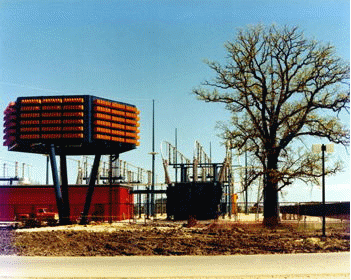Capacitors act as stores of charge and energy and have many uses. The flashguns used in cameras are powered by capacitors. When the camera takes a picture, the charge flows rapidly through the flashgun, producing a pulse of light. After each picture is taken the capacitor must be recharged. This takes a few seconds, which limits the rate at which pictures can be taken.
A similar system operates to power nuclear fusion experiments. Nuclear fusion experiments use lasers to generate high temperatures, which requires capacitors to be charged up to thousands of volts so they can store large amounts of charge and energy. When this is released, hydrogen nuclei are fused together, releasing energy. The massive capacitor in the picture below is part of the energy supply system for the particle accelerator at Fermilab.

Capacitors are widely used in electronics. They can smooth out peaks in voltages, making electronics more reliable. They are also used in back up power supplies, storing enough energy to shut a system down in an orderly way if the power supply fails. Batteries can also be used for this purpose, but capacitors can release energy more quickly since the current that can be delivered by a battery is limited by the internal resistance of the battery. In electric vehicles, they may one day replace batteries for this reason, but the energy storage potential of the battery needs to increase substantially.
